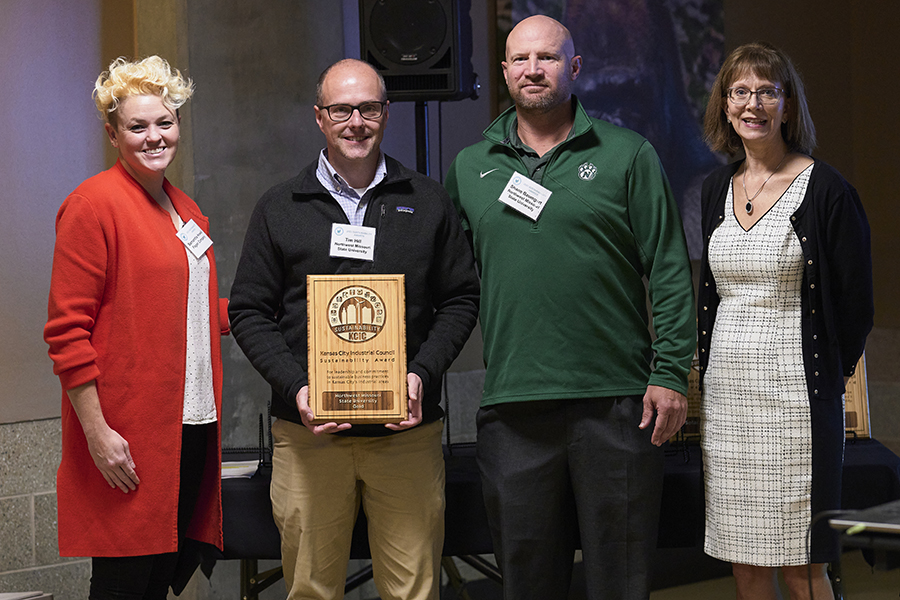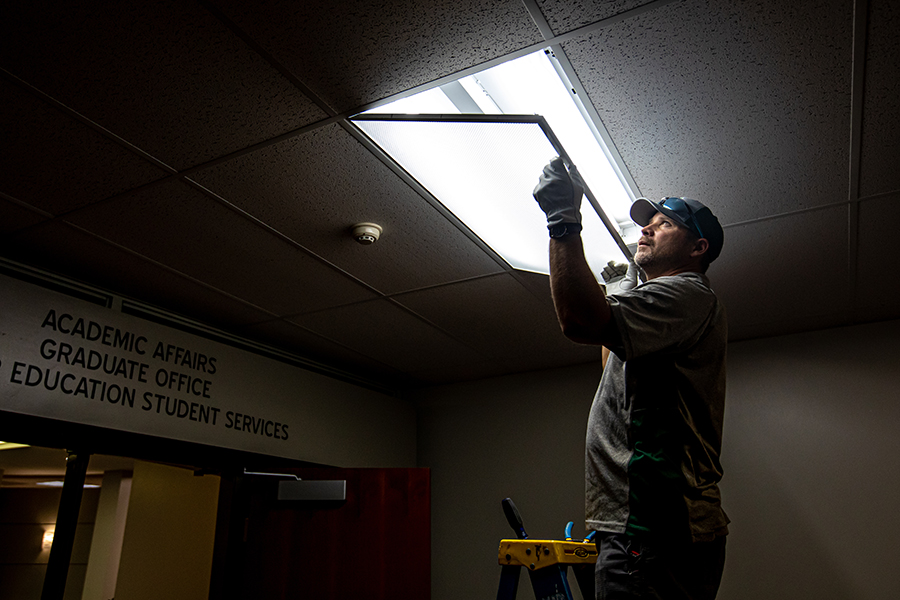Northwest Missouri State University was honored recently by the Kansas City Industrial Council (KCIC), which recognized the University as a Gold Level recipient of the organization’s Sustainability Award for commitment to energy efficiency.
Tim Hill, Northwest environmental sustainability coordinator, and Shane Baumgart, the University’s director of landscape and the Missouri Arboretum, attended KCIC’s Sustainability Awards Breakfast on Oct. 26 at the Kansas City Zoo & Aquarium and accepted the honor on behalf of the University.

Left to right during the awards presentation at KCIC’s Sustainability Awards Breakfast are KCIC Sustainability Committee Member Samantha Howell, Northwest staff members Tim Hill and Shane Baumgart, and KCIC Vice President Susan Brown. (Submitted photo)
Evergy, which supplies the Northwest campus with electrical energy, nominated Northwest for the award.
“It is very gratifying to have our institution’s sustainability efforts recognized by the KCIC,” Dan Haslag, Northwest’s assistant vice president of facility services, said. “We are proud of the progress aimed to conserve energy usage and look forward to continued measures planned to further reduce the University’s carbon footprint.”

Northwest has achieved efficiencies and energy savings by completing lighting improvements throughout its campus. (Photo by Chandu Ravi Krishna/Northwest Missouri State University)
Northwest has been an active participant in Evergy’s energy efficiency and business demand response programs during both 2022 and 2023, helping the University generate significant energy savings and reduce negative impacts during periods of peak electricity demand.
Through its participation in Evergy’s energy efficiency programs, which include retro-commissions as well as HVAC and lighting improvements, Northwest has achieved more than 1.1 million kilowatt hours in energy savings.
By participating in Evergy’s business demand response program, which calls for reducing electricity usage at times of peak electricity demand, the University achieved about 700 kilowatts in demand reduction during the course of seven demand response events this year.
Peak times of demand often use the most carbon-intensive forms of energy, such as coal and natural gas. Participation in the demand response program, Northwest lessens the carbon impact on its community, bolsters grid resiliency and helps reduce electricity costs in northwest Missouri. Northwest’s participation in demand response also maximizes the efficiency of Evergy’s electricity-generating resources, abating the need for construction of new electricity-generating resources.
Additionally, Northwest and Evergy partnered in 2021 on the installation of a grid-connected photovoltaic solar electric generating system to complement two existing solar arrays on the University campus. The combined impacts of the systems include more than 80,000 pounds of reduced CO2 emissions and nearly $3,500 in energy cost savings.
Combined with its sustainability efforts, Northwest’s recycling program also plays a vital role in its community. During fiscal year 2023, Northwest collected nearly 829,000 pounds of recyclable materials with 71 percent of that number comprising cardboard and paper. Metal accounted for about 15 percent, and glass accounted for about 9 percent of that total, while plastic and aluminum products comprised the remainder.